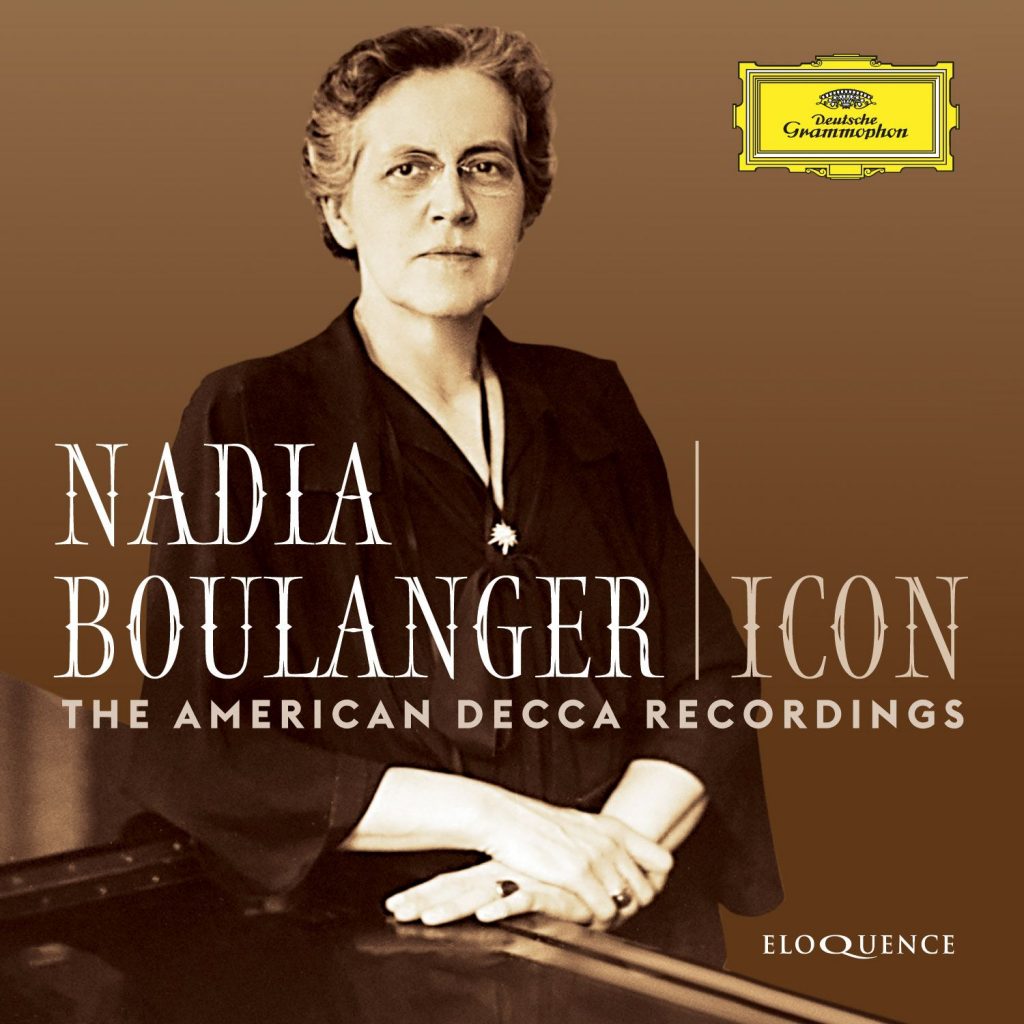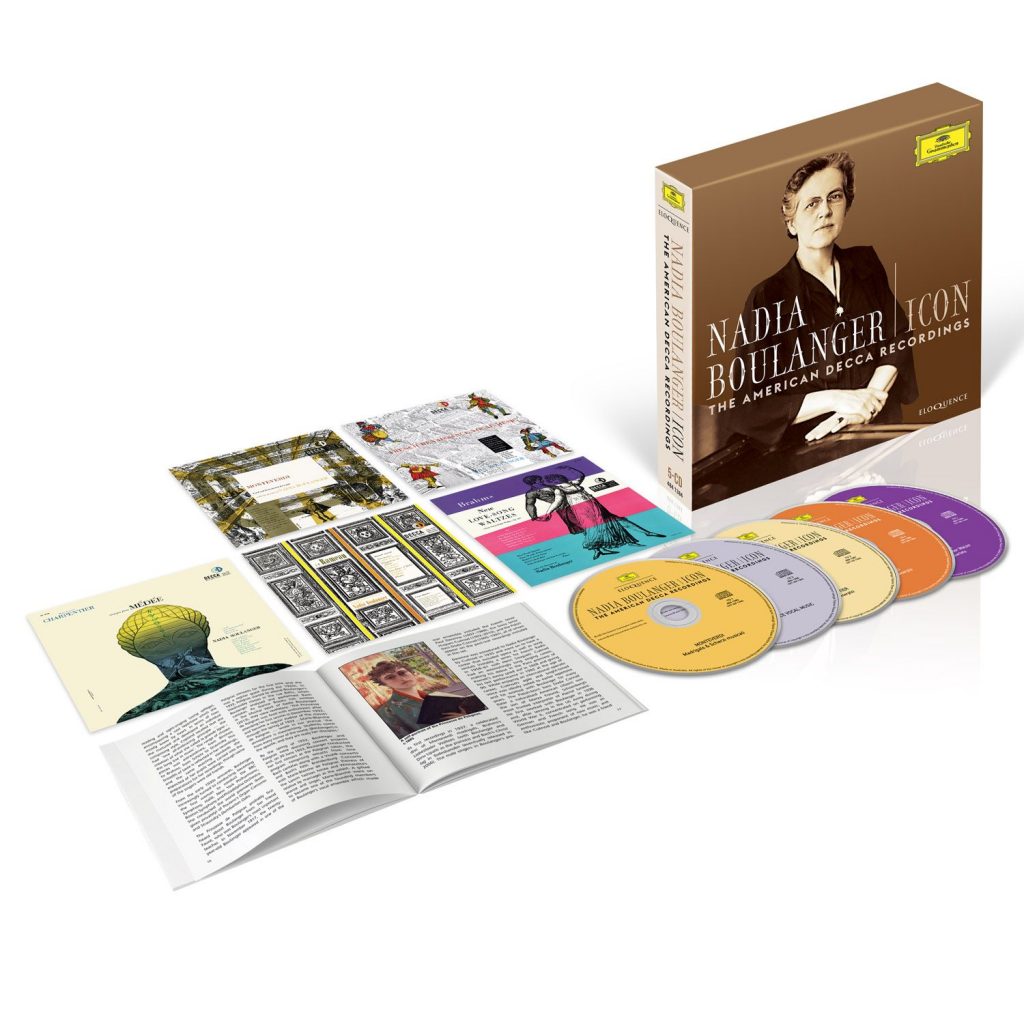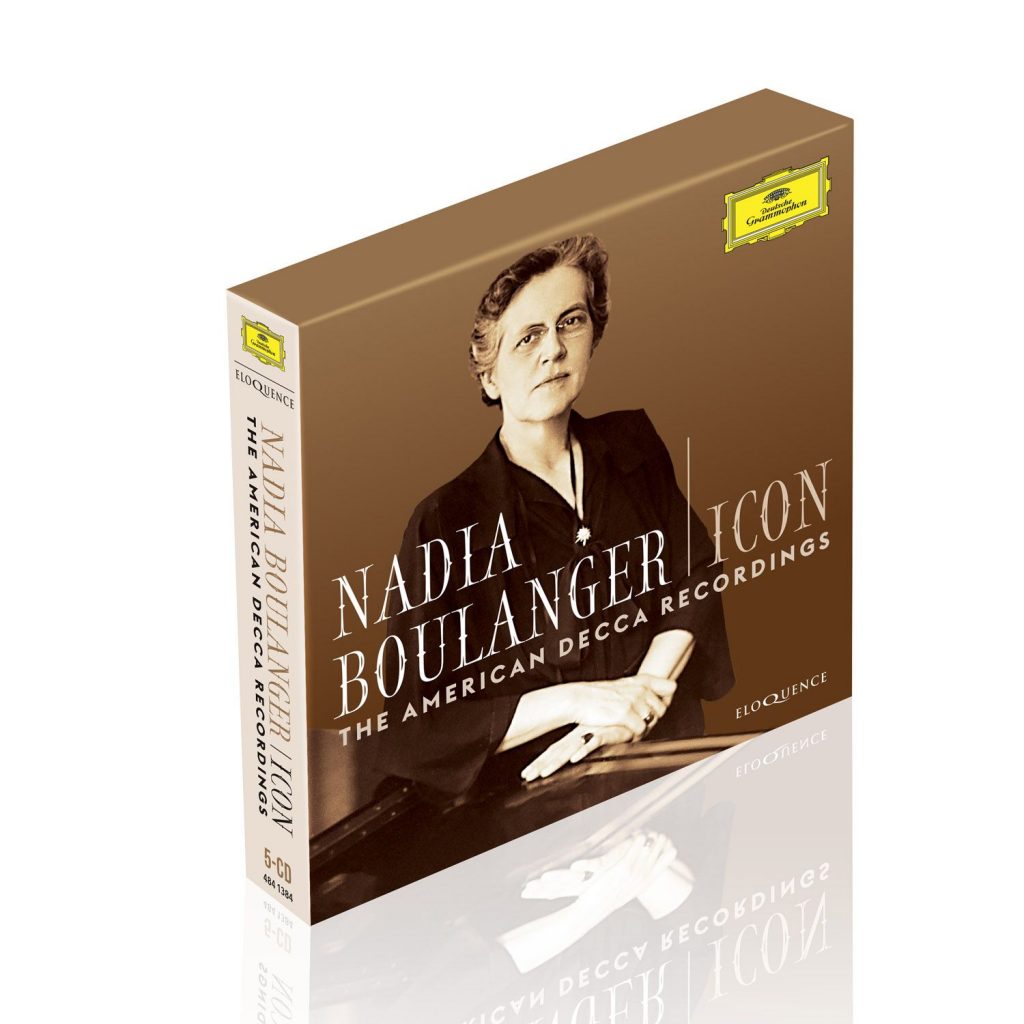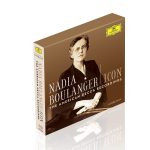From Monteverdi to Brahms via French Baroque rarities: the Decca Gold (US) legacy of a complete musician, newly remastered and issued complete for the first time, with fascinating liner notes by Nigel Simeone. Original Jackets, Limited Edition.
Composer, teacher, organist, pianist, harpsichordist, choir trainer, conductor, musicologist: there seemed to be no end to the talents of Nadia Boulanger though she liked to insist that her gifts paled in comparison to her tragically short-lived sister, Lili. Nadia compensated with ceaseless industry. By the time of her early twenties, having studied with Fauré and undertaken the famously rigorous Paris Conservatoire formation, she was already reviving Bach cantatas in concert. In this guise she came to the attention of the American heiress and assiduous sponsor of avant-garde culture in Paris, the Princesse de Polignac, and with her support founded a vocal consort which made valuable and often-reissued HMV recordings of Monteverdi and Brahms in the 1930s.
Boulanger’s postwar recordings for American Decca, while also made in Paris, are much less widely known, having been issued on Brunswick LPs with limited availability outside the US and on Decca Gold in the US. Having returned to Paris after her wartime exile on the American east coast, she revived her consort for concerts at the Polignac salon, drawing together the most resilient of her older colleagues, such as the tenor Hugues Cuénod, with younger vocal talents such as Nadine Sautereau and Irma Kolassi, who had already established an international career for themselves but were devoted to Boulanger and her tender tyranny in securing precise, selfless and stylish performances of a repertoire that was still largely the exclusive property of scholars rather than musicians.
As well as returning to Monteverdi, the American Decca sessions of 1952–54 venture into what was then much less familiar territory, of chansons and madrigals by the likes of Josquin, Lassus and Le Jeune, winding up with a typically flamboyant Janéquin showpiece which imitates an entire aviary. Then there are pioneering records of excerpts from music-dramas by Charpentier and Rameau, and finally a return to Brahms’s domestic vocal music, though as with Monteverdi in ‘new’ and complementary repertoire, the Neue Liebeslieder and a selection from the more introspective late vocal quartets Opp. 92 and 112. On all these records Boulanger’s affection for the music shines through, as well as her scrupulous attention to the detail of its expression.
CD 1
CLAUDIO MONTEVERDI (1567–1643)
Madrigals: Book 5
1 No. 2: O Mirtillo, Mirtill’anima mia
2 No. 3: Era l’anima mia
Scherzi musicali
3 Damigella tutta bella
Madrigals: Book 9
4 O come vaghi
Madrigals: Book 4
5 Sfogava con le stelle, SV 78
Madrigals: Book 8
6 Dolcissimo uscignuolo
Madrigals: Book 7
7 Interotte speranze
Madrigals: Book 4
8 A un giro sol de’begl’occhi
Scherzi musicali, cioè arie, et madrigali in stil recitativo
9 Quel sguardo sdegnosetto
Madrigals: Book 8
10 Su, su pastorelli vezzosi
Madrigals: Book 6
11 No. 7: Qui rise, O Tirsi – five voices (Marini, 1614)
Flore Wend, Donna Rumsey, Geneviève Massignon, sopranos
Nancy Waugh, mezzo-soprano · Violette Journaux, contralto
Hugues Cuénod, Paul Derenne, tenors · Bernard Cottret, Doda Conrad, basses
Instrumental Ensemble
Nadia Boulanger, harpsichord / conductor
FIRST CD RELEASE ON DEUTSCHE GRAMMOPHON
CD 2
FRENCH RENAISSANCE VOCAL MUSIC
JOSQUIN DES PREZ (c.1450–1521)
1 Mille regretz
CLÉMENT JANEQUIN (c.1485–1558)
2 Ce moys de may
CLAUDE LE JEUNE (c.1528–1600)
3 Hellas, mon Dieu ton ire s’est tournée
ORLANDE DE LASSUS (1532–1594)
4 Bonjour, mon Coeur (No. 1 of Quatriesme livre des chansons a 4 et 5 parties)
GUILLAUME COSTELEY (1530–1606)
5 Noblesse gît au Coeur
ORLANDE DE LASSUS (1532–1594)
6 Quand mon mari vient de dehors (No. 4 of Quatriesme livre des chansons a 4 et 5 parties)
Traditional
7 A déclarer mon affection
GUILLAUME COSTELEY (1530–1606)
8 Mignonne, allon voir si la roze
CLAUDIN DE SERMISY (c.1490–1562)
9 Hau, hau, hau le boys (31 Chansons musicales)
CLAUDE LE JEUNE (c.1528–1600)
10 Revecy venir du printemps (Le Printemps, 1513)
JACQUES MAUDUIT (1557–1627)
11 Vous me tuez si doucement (Chansonettes mesurées)
CLAUDE LE JEUNE (c.1528–1600)
12 Tu ne l’enten pas, c’est latin
CLAUDIN DE SERMISY (c.1490–1562)
13 Au Joly boys
PIERRE BONNET (c.1600)
14 Francion vint l’autre jour
CLÉMENT JANEQUIN (c.1485–1558)
15 Le Chant des oiseaux
Flore Wend, Monda Million, Geneviève Massignon, sopranos
Nancy Waugh, mezzo-soprano
Violette Journeaux, contralto
Hugues Cuénod, Paul Derenne, tenors
Doda Conrad, Bernard Cottret, basses
Nadia Boulanger, conductor
FIRST CD RELEASE ON DEUTSCHE GRAMMOPHON
CD 3
MARC-ANTOINE CHARPENTIER (1643–1704)
1–21 Medée
Excerpts
Flore Wend, Nadine Sautereau, sopranos
Irma Kolassi, Maria Férès, mezzo-sopranos
Violette Journeaux, contralto
Paul Derenne, tenor
Bernard Demigny, bass-baritone
Doda Conrad, bass
Instrumental and Vocal Ensemble
Nadia Boulanger
FIRST CD RELEASE ON DEUTSCHE GRAMMOPHON
CD 4
JEAN-PHILIPPE RAMEAU (1683–1764)
Excerpts from:
1–4 Dardanus
5 Castor et Pollux
6 Hippolyte et Aricie
7 Dardanus
8 Les Indes Galantes
9–10 Hippolyte et Aricie
11 Castor et Pollux
12 Les fêtes d’Hébé
13 Acanthe et Céphise
14–15 Les fêtes d’Hébé
Flore Wend, Nadine Sautereau, sopranos
Irma Kolassi, Maria Férès, mezzo-sopranos
Paul Derenne, Jean Maciet, tenors
Bernard Demigny, bass-baritone
Doda Conrad, bass
Instrumental and Vocal Ensemble
Nadia Boulanger
FIRST CD RELEASE ON DEUTSCHE GRAMMOPHON
CD 5
JOHANNES BRAHMS (1833–1897)
1–15 Neue Liebeslieder Walzer, Op. 65
16–18 Three Quartets, Op. 64
19 O schöne Nacht, Op. 92 No. 1
20 Sehnsucht, Op. 112 No. 1
21 Nächtens, Op. 112 No. 2
Flore Wend, soprano
Nancy Waugh, mezzo-soprano
Hugues Cuénod, tenor
Doda Conrad, bass
Nadia Boulanger, piano / conductor
Jean Françaix, piano II (Neue Liebesliederwalzer)
FIRST CD RELEASE ON DEUTSCHE GRAMMOPHON
CD 1
Recordings: Paris, France, August 1952
Original American Decca Release: DL 9627
CD 2
Recordings: Paris, France, August 1952
Original American Decca Release: DL 9629
CD 3
Recordings: Paris, France, 21 January 1953
Original American Decca Release: DL 9678
CD 4
Recordings: Paris, France, 21 January 1953
Original American Decca Release: DL 9683
CD 5
Recordings: Paris, France, 22 May 1954
Original American Decca Release: DL 9650
“One finishes listening to this disc with renewed admiration for Monteverdi’s astonishing genius. … Nadia Boulanger’s profound understanding of his genius is without peer in the world” Alec Robertson, Gramophone, July 1954 (Monteverdi)
“It is in the French works that the group really reaches the heights. Here the light, French tone is perfectly apt, and it is gratifying to be able to report the ultimate subtlety – Mlle. Boulanger’s use of a different quality of vocal tone for each of the works, depending on the period and the subject matter.” High Fidelity, July 1953 (French Renaissance Vocal Music)
“No-one living has mastered this style, in its grave urgency, better than Mme. Boulanger, who gives it back without contaminating its archaic eloquence with archness.” High Fidelity, November 1953 (Rameau)
“This disc … displays her genius at its finest … I have enjoyed every moment of this enchanting disc, and am sure it will have an appeal far outside specialist circles.” Gramophone, June 1954 (French Renaissance Vocal Music)
“A well-balanced and quite comprehensive selection of the music of Medée … The performances offered by Mlle. Boulanger and her group leave little to be desired in the way of energy and rhythmic vitality … Sautereau offers as perfect a version of Creuse’s halting, dying words as one could wish for.” Musical Quarterly, July 1954 (Charpentier)
“Nadia Boulanger’s control of the score is wholly magnificent, a great artist at work … wonderfully vivid” Philip Hope-Wallace, Gramophone, July 1954 (Charpentier)
“Spirit and fine ensemble.” Gramophone, August 1955 (Brahms)









